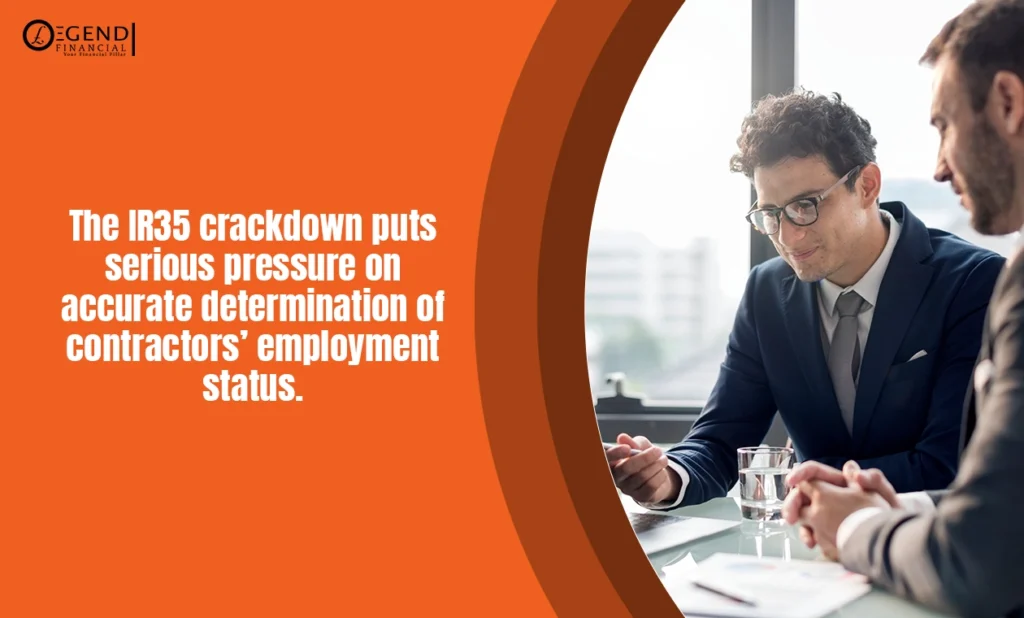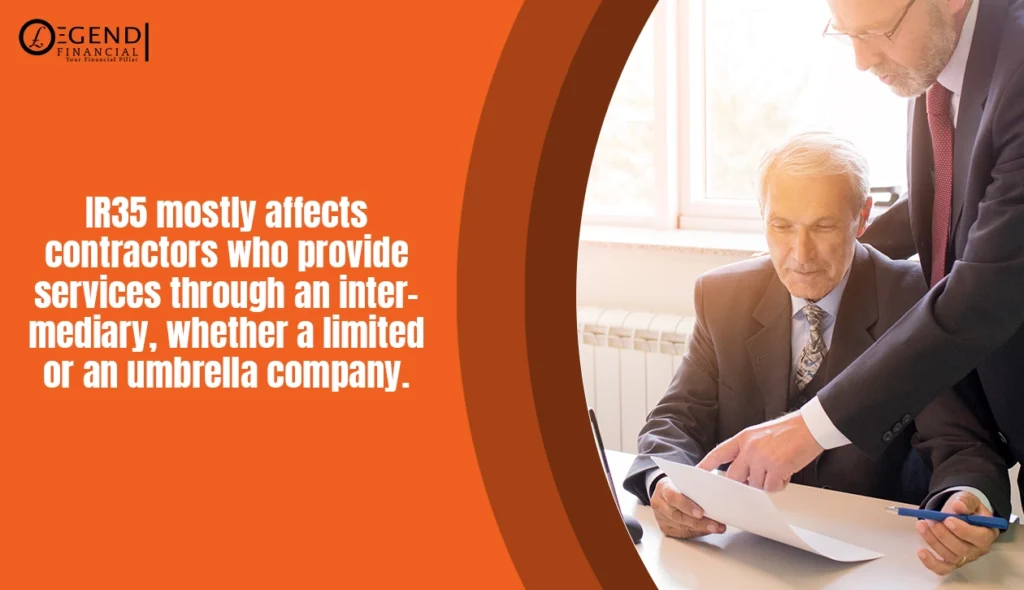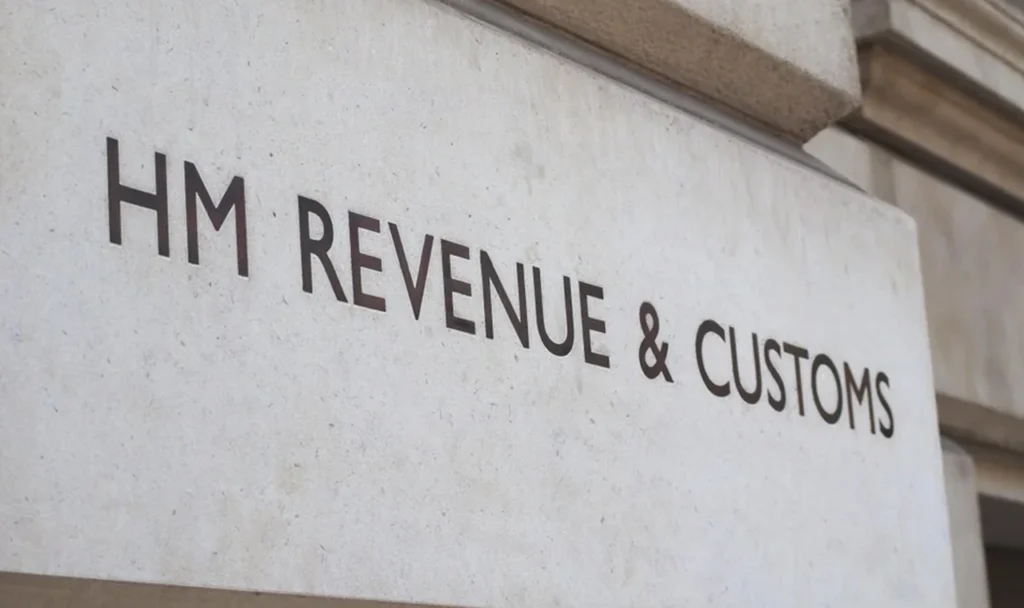Contents
IR35 rules sift out the employed from the genuinely self-employed for tax purposes. It became a law in April 2000 but was only taken seriously in 2018, when IR35 crackdown was at its peak. You need to be genuinely self-employed to ever determine yourself outside IR35.
The crackdown ensures no one takes advantage of anymore tax loopholes. Stay updated with the current IR35 rules in this guide.
What Is IR35 Legislation?
IR35, properly known as Intermediaries Legislation, is also known as off-payroll working rules, aimed at preventing tax evasion among contractors. Whether one is inside or outside the IR35 was not strictly evaluated, so many had been deliberately or non-deliberately violating the legislation up until 2018.
Many identified as ‘self-employed’ due to its tax and full-time work benefits. This has resulted in £1.3 billion amount of tax revenue avoided each year before the IR35 crackdown. With the new IR35 reform, ‘disguised employees’ are more accurately identified.
HMRC now inspects the actual nature of the work relationship, not only the contract, which Inland Revenue refers to as “can be written, oral or implied, or a combination of all three.” If shown to be ‘employed,’ you are inside IR35; if genuinely self-employed, you need not worry about the IR35 crackdown.
This ensures employed contractors pay income tax and National Insurance like regular employees, ensuring equality in the contractual sector.

Current IR35 Rules [Updates]
The IR35 tax legislation has been constantly changing. It was substantially updated in April 2024 with Chancellor Reeves. These changes were minor and only apply if HMRC successfully challenges outside determinations.
Currently, IR35 rules can lead to double taxation if HMRC challenges a contractor’s ‘outside IR35’ status. New rules would enable HMRC to collect an estimated difference in taxes between what has been paid and what is actually due, preventing employers and contractors from being taxed twice.
Contractors may be eligible for a tax refund, but the process is complicated, hence, not commonly pursued. The new offset rules aim to fairly distribute tax liabilities and reduce costs for businesses using off-payroll workers, increasing their confidence in engaging personal service company (PSC) workers again.
Who Does IR35 Apply To?
The IR35 assessment usually challenges your status in the following cases:
- you work through an intermediary or your personal service company (PSCs)
- you registered as a limited company and believed you are outside IR35
- you hire workers who operate through intermediaries or limited companies (for the paying end client)
The paying end client or recruitment agency is now responsible for determining the employment status, no longer the contractor. You could be seen as an employee (inside IR35) if you work like an employee, even if you are registered as self-employed.
The off-payroll working rules apply alongside the Construction Industry Scheme (CIS) rules whether you are in the private sector or public sector. Check out our CIS registration guide if you work in the construction industry.
What Is Inside IR35?
If you are considered inside IR35, you are treated as an employee rather than self-employed. You will need to pay income tax and National Insurance through PAYE. However, you will not receive the same employment benefits, such as sick leave or paid holidays.
Your hirer will deduct income tax and National Insurance contributions (NICs) from your gross pay before transferring the net amount to your limited company. The expenses you can claim may be limited.
If you are working from home, read: Do You Get Tax Relief Working from Home in the UK?

Limited vs Umbrella Company
HMRC checks IR35 for dummies or contractors working under an intermediary, either umbrella or limited company. Through an umbrella company, you are considered an employee, hence inside IR35. Whether or not you are inside IR35 as a contractor with a limited company depends on your nature of work relationship and contract.
Umbrella companies are responsible for paying PAYE and NICs on your behalf. Under this setup, you can maintain the flexibility of contracting whilst receiving employment benefits and protections. This is your best option if you are contracting for a short time. However, if you will be working on a project longer, consider setting up a limited company.
Good News for Workers Under CIS: You can apply for a mortgage with less than a year of income proof showing your net income through a loan construct informally called CIS mortgage. Find out how you can get closer to achieving your dream house through affordable CIS mortgages.
What Is Outside IR35?
If you are genuinely self-employed, you provide services to clients as a real business under a business-to-business contract, which means you are unaffected by the IR35 crackdown in any way. Usually, this is by being a limited company.
Moreover, if you qualify as a small business contractor, you are responsible for determining your status. Overall, under a limited company, you can tax-efficiently combine salary and dividend payouts as a director and, if incorporated, deal with corporation tax (which is lower than income tax).
Useful read for businesses: VAT Schemes in UK.
Determine Your Status Correctly
Determining the right employment status can be complex, often requiring extensive contract reviews for contractors. Many employers engage tax experts for this, especially larger businesses. Medium and large companies may simply use any IR35 shield for business, which allows for assessments of all candidate contractors in just one day.
The assessment usually takes about 15 minutes and provides accurate results. You can also use HMRC’s CEST tool (Check Employment Status for Tax). There are three main factors to correctly identify if a contractor is outside IR35:
- Control: The contractor has autonomy over their services, including how, when, and where they work, without being controlled by the client.
- Mutuality of Obligation (MoO): Contractors set their project timelines, can modify contracts if work changes, and can refuse projects—indicating no obligation to provide services continuously.
- Right of Substitution: Contractors can assign another individual to carry out the work if they are unable to do so, indicating that the service is not personal.
If they do not meet these criteria, they fall inside IR35 status.
IR35 Crackdown: Effects and Penalties
With the IR35 crackdown in place, you need to be cautious about declaring statuses. Otherwise, you may face the following penalties:
- 30% unpaid tax for ‘careless’ determinations.
- 70% unpaid tax for non-deliberate mistakes not promptly corrected.
- 100% unpaid tax for deliberately using wrong employment status to evade tax.
HMRC can review your contracts for up to six years but may pause if you reach a settlement and errors are acknowledged. However, even if compliance checks are paused, interest on any due tax will continue to accrue.
Read more about HMRC’s Tax Investigations.
Will IR35 Be Repealed?
Before IR35, employees leave their status to return as contractors with similar roles, using limited companies to gain tax advantage. HMRC struggled to monitor non compliance effectively. With the Conservative Party, the IR35 crackdown happened.
However, the Labour Party is deciding whether to repeal IR35, introducing a new Single Worker Status, which might also be relevant to IR35 reform. It is still uncertain if the repeal would revert to the original IR35 or involve new measures to prevent tax loss.
There is a consensus that the current IR35 framework of the Conservatives may be less risky compared to the potential chaos of abolishing it entirely. The need for stable regulations suggests any elimination of IR35 might lead to disorder in the contracting landscape.
Extra Tips for IR35 Compliance
Know your responsibilities under IR35 as an employer or fee-paying end client:
- Also assess the tax status of contractors hired directly (not through intermediaries).
- Ensure you review contracts with contractors to determine IR35 applicability, ensuring you are not facilitating tax evasion, especially if continuing with umbrella company arrangements.
- Create a Status Determination Statement (SDS) and share it with each contractor.
- Establish a process for contractors to challenge their SDS.
Seek Expert IR35 Advice
Determining the right employment status for IR35 can be really tricky, and the penalties can be severe. Whether you are an employer or a contractor, it is wise to seek assistance from tax experts. Legend Financial is your buffer for the IR35 crackdown. We make sure you declare employment statuses correctly, every time, and most especially stay compliant with all your tax obligations. Reach us today!












